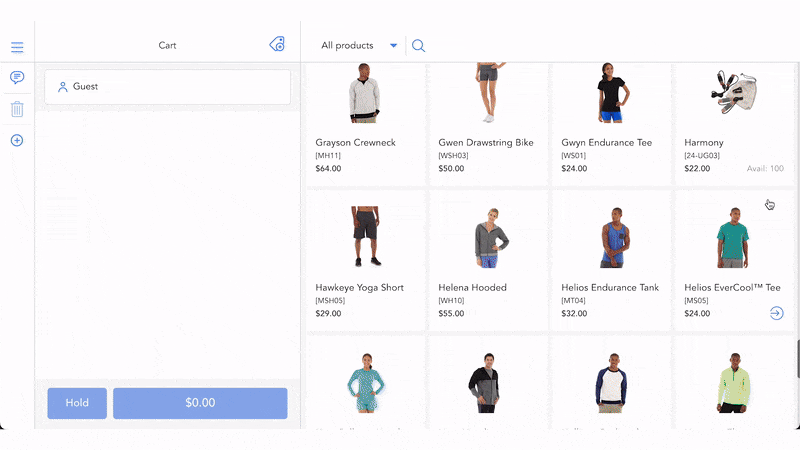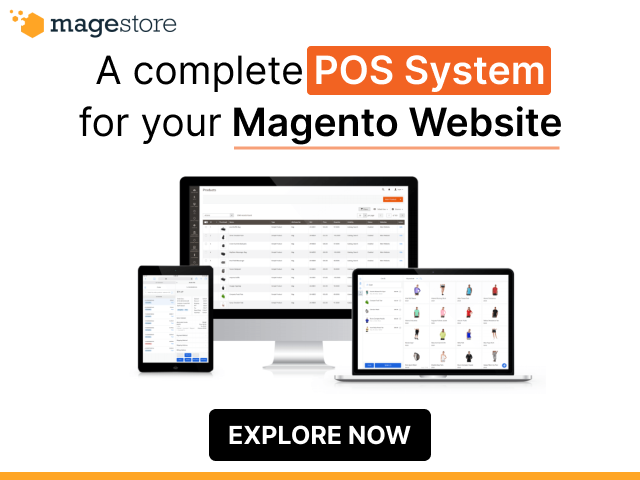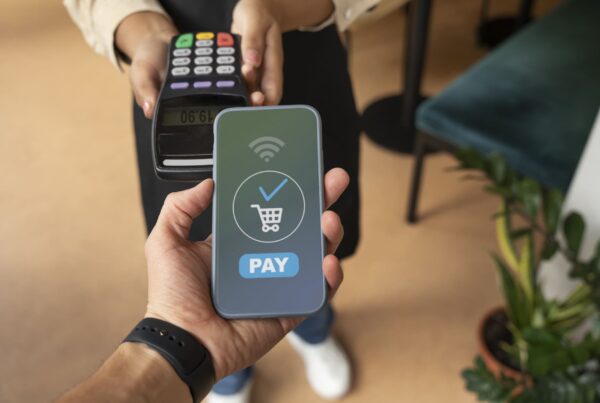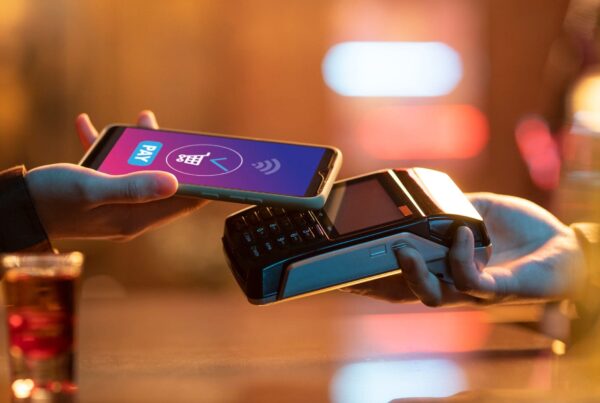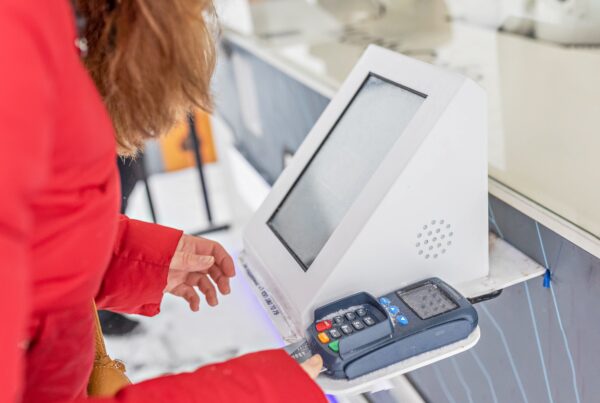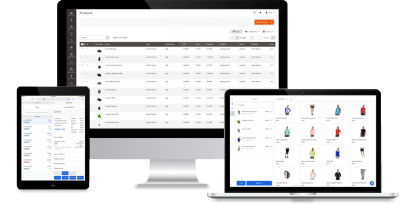The retail industry has gone through a big evolution with the omnichannel trend. POS software doesn’t merely process payment, it now helps you serve customers seamlessly regardless of where they touch your brand, such as your online, in-store, and on-the-go shopping platforms. A robust omnichannel POS system allows you to streamline the connection between your physical and digital channels, syncing all data to provide a consistent experience for shoppers. It offers a method to understand your customers’ behaviors while managing your inventory and fulfilling orders easily across all channels.
What is an omnichannel POS system?

Omnichannel POS software is a flexible retail solution to manage your retail operational activities, including sales, checkout, customer service, stock management, etc. by connecting all back-end operations and customer-facing services. By synchronizing all data, it provides a unified shopping experience for customers across all channels.
With the help of omnichannel POS, merchants can track and engage with their customers anywhere, thus gaining more insights into their behaviors and preferences. This is essential to creating personalized promotions and enjoyable, consistent experiences across various sales channels that can lead to more product sales.
Let’s explore the benefits of omnichannel POS software.
Why I need an omnichannel POS for my business

Here’re the top 5 benefits of POS that can boost your omni channel retail:
1. Boost revenue and profit
Omnichannel POS creates new sales opportunities apart from traditional stores, such as online marketplaces, websites, mobile apps, and social commerce, providing customers with more options to shop for their convenience.
Smooth connections of all channels can create many ways of shopping like O2O or click-and-collect. Customers can look for a product and complete an order anywhere, and choose a channel they want to receive the order. This is possible thanks to omnichannel distribution. Being present through multiple channels gives you more brand visibility and more chances to persuade customers to buy, both online and offline.
In addition, one of the best omnichannel benefits is the ability to track customer behaviors across all channels — the important data to understand customers to create personalized offers for them. Suggesting the right products at the right time will lead customers to purchase items they have an interest in, improving your sales performance.
2. Enhance customer satisfaction
Customers today demand more freedom to shop their way. The customer journey has become more complex than ever as customers can start their shopping experience at whichever touchpoint and go through other channels as they want. Therefore, you must recognize the same customers across channels to offer them a consistent experience no matter how they prefer to shop. This is another POS benefit for you: centralizing all data from all channels, such as eCommerce, mobile, physical stores, and social media.
Providing a single view of the retail brand through omnichannel is how you can foster customer engagement and increase satisfaction. Since all product data and sales data are managed under 1 omnichannel POS, you have more sources to learn and dig deeper into customer’s insights. From there, you can provide customers with detailed product information and customized content for them, together with a fast, accurate, and efficient service.
3. Boost customer loyalty
An outstanding shopping experience is a huge advantage when customers come to shop. If you exceed customers’ expectations, they’ll be more likely to return to your store. Having a satisfied and loyal customer base helps you maintain a stable business without spending too much to acquire new customers.
An omnichannel POS software can let you generate and manage loyalty programs like store credits, reward points, birthday cards, or discounts for customers who have spent over a certain amount. Besides, you can measure the effectiveness of these loyalty programs and make changes to suit your strategy.
4. Consistent product and pricing information
By centralizing all product data in one backend platform, the POS software ensures product and price consistency across all stores and channels. You can create product SKUs and edit product information quickly, then all your stores will be updated simultaneously. This removes the burden of manual input for each location which can cause errors. Now you only need a few clicks and never worry about discrepancies among stores.
5. Sync inventory data in real time
Among various POS system benefits, gaining complete visibility of inventory is essential for retailers. With an omnichannel POS solution, all data of stock flows and sales orders are connected under a central system. As your customer purchases from any channel, your inventory level is updated automatically in real time. Therefore, you no longer need to make the reconciliations between multiple platforms which is time-consuming, freeing your employees for more important tasks.
Real-time inventory lets you know which items are running low on stock to reorder. Based on lead time and forecasted demand, it can alert you of the time and the quantity you should replenish your warehouse. Thus, you can optimize your storage costs and order fulfillment, avoiding both over and understocking.
Furthermore, syncing data across all processes is the foundation of omnichannel fulfillment. It starts from the time a customer starts looking for a product, compares prices, makes an order, to the time you deliver the item to the end user. The entire journey involves many steps like pick up, warehousing, packaging, and shipping, where the data channels are closely integrated.
How I can find an omnichannel POS system

To choose a best-fit omnichannel POS software for your retail company, follow these 4 steps:
Step 1: Think about what features you need
Let’s start with your business’s goals and omnichannel strategy before choosing a POS provider. Based on different needs, you can choose the POS that focuses on helping you achieve what you want. Moreover, list in order your priority, from “Must have” to “Not really necessary”, so you can have a more accurate view of what are the most important POS features for your business.
Some questions you should consider are:
- Which channels do you want to sell your products on?
- Do you need a basic or advanced inventory management system?
- Do you want to track sales data?
- Do you want to create customer profiles and management?
- Do you need the POS to support various types of payments?
- Do you need loyalty program features?
- How do you want to manage suppliers and the purchasing process?
Popular eCommerce platforms like Magento and Shopify offer some essential features such as channels, inventory tracking, sales data, customer profiles, and payment options to help manage your business effectively. By choosing a POS system that integrates with these eCommerce platforms like Magestore POS, you can take full advantage of these features. Magestore provides customizable and scalable POS solutions, including both POS for Magento and POS for Shopify, allowing you to tailor the system to your specific needs while benefiting from the standard capabilities of these platforms.
Step 2: Determine your budget
Next, think about the cost you’re willing to invest in an omnichannel POS solution. It’s important to consider the cost-benefit ratio. Check if the cost is worth the value you receive in the long run, for example:
- How does the POS save you time by speeding up transactions and controlling inventory flow?
- How does it free up human resources and eliminate manual errors?
- How does it boost your revenue and profit across channels?
- How does it contribute to making customers loyal?
- Can it scale up with you if you open new stores or expand to a new market?
While some POS software may have a low starting fee and work well for you at the moment, you should check whether it can meet your needs in the future. You don’t want to disrupt your business to replace another POS system — which will take time to set up processes and train employees all over.
Step 3: Compare different types of POS software
There are 3 main types of POS software for you to choose from on-premise, cloud-based, and hybrid.
On-premise POS software is installed and stores data on your servers. You have full control over it and can do the maintenance yourself. However, this POS type is expensive to install and you need a technical team to maintain it.
A cloud-based POS software operates on a remote server owned by the POS provider. Cloud-based systems offer better security and performance than on-premises software. You don’t have to invest in physical space to store your data, which saves a lot of costs but also compromises some control over how the software is managed and updated.
Hybrid systems a hybrid POS combines the reliability of an on-premise POS and the convenience of a cloud-based POS. It can continue working when the Internet goes down, and upload the data to the central system when the Internet is restored. This ensures customers always receive a consistent and seamless shopping experience at all times.
Here’re some advantages of a POS system that you may want to learn more about.
Step 4: Shorten the vendor list and evaluate their suitability
Once you know what you expect in your POS software, you can research and pick several providers that best suit your requirements and stay within your estimated budget. Then, contact the POS providers for a demo or consultation. To evaluate the POS adequately and ensure there are no surprises or hidden costs, share your priority requirements and prepare a detailed question list for each provider.
Some criteria you should pay attention to for the assessment of POS vendors:
- Ease of use: Rate software by how it is easy to pick up for new staff,
- Appropriate features: Give a score based on how much the software suits your needs,
- Must-have features: Disqualify the providers who don’t have these features,
Customer support: Consider the vendor who provides technical support whenever you request, - Prices: Compare the prices among different versions of 1 POS and different POS systems,
- Capacity and experience of the POS supplier: Choose the POS with a good reputation and proven capability to grow with you in the future.
Top wrap up
The benefits of omnichannel strategy are tremendous that it has become a trend for all-sized businesses to boost their sales. Investing in the right omnichannel POS software will give you the flexibility to embrace changes and serve customers as they want. If you want to install a powerful omnichannel POS system fully customized for you, Magestore is the right place to come. Contact us today and uplift your business.

